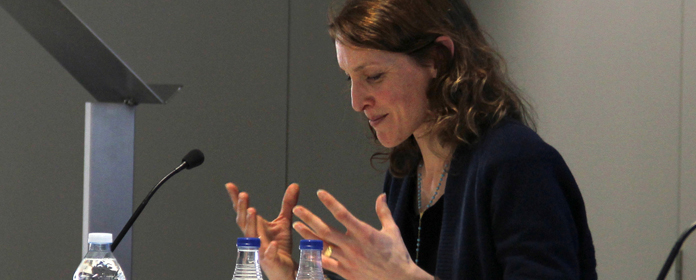¿Somos prisioneros de nuestros hábitos?
Clare Carlisle, filósofa de King’s College London, indicó en el Instituto Cultura y Sociedad que los hábitos “dan forma a nuestras vidas: cómo nos despertamos, nos relacionamos o trabajamos”

FOTO: Elena Beltrán
Te levantas, te aseas, sigues un determinado camino al trabajo… Muchas veces nos sentimos atrapados por las rutinas diarias y deseamos escapar de ellas, pero, ¿suponen una trampa vital o nos facilitan las cosas? “Los hábitos son una fuerza que da forma a nuestras vidas: cómo nos despertamos, nos relacionamos o trabajamos”, afirma Claire Carlisle, filósofa del King’s College London (Reino Unido).
La experta impartió un seminario en el Instituto Cultura y Sociedad de la Universidad de Navarra sobre ‘Hábitos y prácticas’, invitada por el Grupo ‘Mente-cerebro’. En él hizo hincapié en que estos términos diferencian acciones que se afianzan por la repetición.
Por un lado se encuentran las prácticas, entre ellas hacer deporte, tocar el piano o conducir. “En estos casos lo que queremos es cambiar nosotros mismos: ser un buen músico o deportista…. Lo que queremos es el resultado final y para ello decidimos repetir la acción”, comenta. De este modo, la acción individual nos cuesta e insistimos porque queremos desarrollar una práctica para dominar una habilidad.
Por otra parte están los hábitos. “El problema es que caemos accidentalmente en algunos, como fumar o beber alcohol. Lo que queremos es fumar un cigarro o beber una copa, no repetir la acción”, especifica, pero añade que a base de querer esa sola acción -aunque sea individualmente- se acaba por crear un hábito, en este caso nocivo.
“Así que lo que empieza como una decisión al final no lo parece, porque cuando se repite se convierte en algo más automático. Es un poco paradójico pero es algo que todos hemos experimentado”, expresa Carlisle.
Escapar de los hábitos¿Eso significa que no hay forma de escapar de los hábitos? En el caso de los bebedores o fumadores, apunta que “aunque se hayan elegido las acciones particulares, no se ha elegido convertirse en adicto, pero es cierto que se ve una responsabilidad”. Más difícil encuentra el caso de las personas que adquieren un hábito que se les enseña: “Resulta más complicado hablar de responsabilidades porque no han elegido tener ese hábito, pero es cierto que siempre existe la posibilidad de cambiarlo, por mucho que cueste”.
Para romper los hábitos que se han convertido en adicciones considera importante prestar atención y ser consciente de las sensaciones y los sentimientos que produce ese hábito con el fin de romperlo. “Entenderlo mejor puede debilitar la fuerza que tiene”, apostilla.
Además, aporta tres sugerencias. La primera es desarrollar una práctica: decir no insistentemente a esa acción, aunque no sea lo que nos pide el cuerpo. “Si se quiere dejar el tabaco se tiene que insistir diciendo ‘no’ cada vez que se tengan ganas de fumar”, recomienda. En segundo lugar, propone realizar otras acciones cuando aparezca la necesidad de la adicción, como por ejemplo dar un paseo. Y por último recomienda evitar ciertos ambientes en los que puede surgir un deseo relacionado con la adicción hasta que esta se haya superado -por ejemplo, los centros comerciales si uno es comprador compulsivo-.
Adicción a las tecnologíasLa filósofa confirma que siempre hay posibilidad de cambiar un hábito, pero enfatiza que no es fácil en todos los casos: “A veces está reforzado por la sociedad y es casi imposible huir de él”. Por ejemplo señala el uso de internet y los móviles; es muy complicado ignorar estas tecnologías cuando forman parte de la sociedad, del trabajo y del ocio. “Si toda una cultura está incorporando unos hábitos, ¿a dónde vas? ¿Cómo huyes de eso?”, se pregunta.
Para finalizar, insiste en que no hay que librarse de todos los hábitos, pues no necesariamente son negativos: “en algunos casos bastante obvios esclavizan, pero también es cierto que en otros nos liberan”. Así, recuerda que una vez que se domina una habilidad se puede desempeñar la tarea sin pensar y de esa forma la mente queda liberada para hacer otras cosas.




